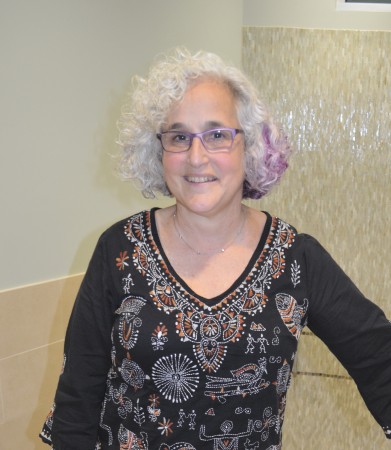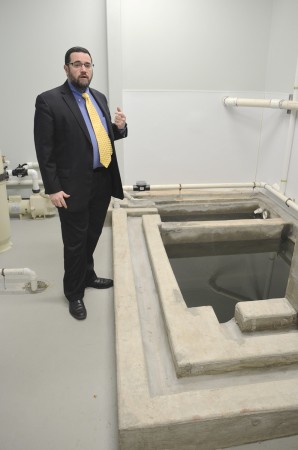
Rituals matter. People need ways to mark the big events – marriages, say, or deaths or births – that change their lives.
Jews in metro Atlanta soon will have a new place for the traditional immersion ritual used to mark such big life events. The new Metro Atlanta Community Mikvah, a place for ritual baths, opens this month at Congregation B’nai Torah, 700 Mt. Vernon Highway, in Sandy Springs. A ribbon-cutting ceremony is scheduled for Nov. 15.
“In the community, it’s a pretty big deal, if I do say so,” said Rabbi Joshua Heller of Congregation B’nai Torah, who said 20 synagogues and organizations in the metro area will rely on the facility. “This is one of the few religious resources that is shared so widely.”
Alice Wertheim of Dunwoody, president of the board of directors of the new mikvah, said the facility will be open to anyone in the Jewish community who wants to use it.
“This is a sacred space that brings together varied elements of the community, and that doesn’t happen very often,” she said. “Most open spaces are secular. This is a sacred space – that’s what makes it different. It’s unique and it’s exciting, and it adds another dimension to the spiritual life of the community.”
A mikvah is a special pool used for Jewish ritual immersion, according to MACoM, the nonprofit organization building the facility. “It’s a ritual accessible to anybody,” Wertheim said.

In its brochure describing the new pool, MACoM says, “Traditional uses of mikvah include immersing when converting to Judaism, before getting married, before the Shabbat or other Jewish holidays, and to make a woman’s monthly cycle.”
Similar facilities exist at a few other synagogues in metro Atlanta and the new one replaces an older one at B’nai Torah, Wertheim said. But she believes the new $850,000 facility built alongside B’nai Torah will find new users hoping to mark more and more varied types of life-changing events.
“All these rituals, they are all transitional moments,” she said. “In conversion, you are going from non-Jew to Jew. In marriage, you’re going from non-partnered to partnered. It’s essentially a very private moment in that you get naked and you go into the pool. It’s a very private moment.”
The mikvah’s supporters foresee people using it mark personal milestones, from bar mitzvahs to adoptions to starting a new job to finalizing a divorce. Heller said he expects the new facility to be used more than 300 times in its first year. He expects that could rise to more than 700 times a year.
“We are seeing a generation of people who are claiming it as a very powerful ritual,” Heller said.
The rabbi said he used B’nai Torah’s old mikvah regularly when preparing himself for services. “It’s an incredibly powerful ritual,” he said. “It’s an incredibly visceral experience. I would often come to the old mikvah on the eve of the Sabbath. It is a tremendously powerful spiritual experience.”
The new pool is built to exacting standards, Heller said. “The laws of construction of a mikvah are among the most complicated in Judaism,” he said.
A portion of the water in the pool “has to be water that flows without human hands or tools being involved,” he said. “No buckets. No pumps.”
So, some of the water used in the pool is collected from the building’s roof, gathered in a pair of cisterns and delivered by troughs on the floor. The water is filtered, he said. The devices used to collect and deliver the natural water fill a room, but ensure the facility is kosher, he said.
The building containing the new mikvah also has an area in a hallway leading to the pool where friends and family can gather to listen to the event as witnesses. The building also offers a pair of dressing rooms where people clean up before entering the ritual pool.
“You’re not going into the pool to clean yourself,” Wertheim said. “You’re going into the pool as a way of marking the moment.”
